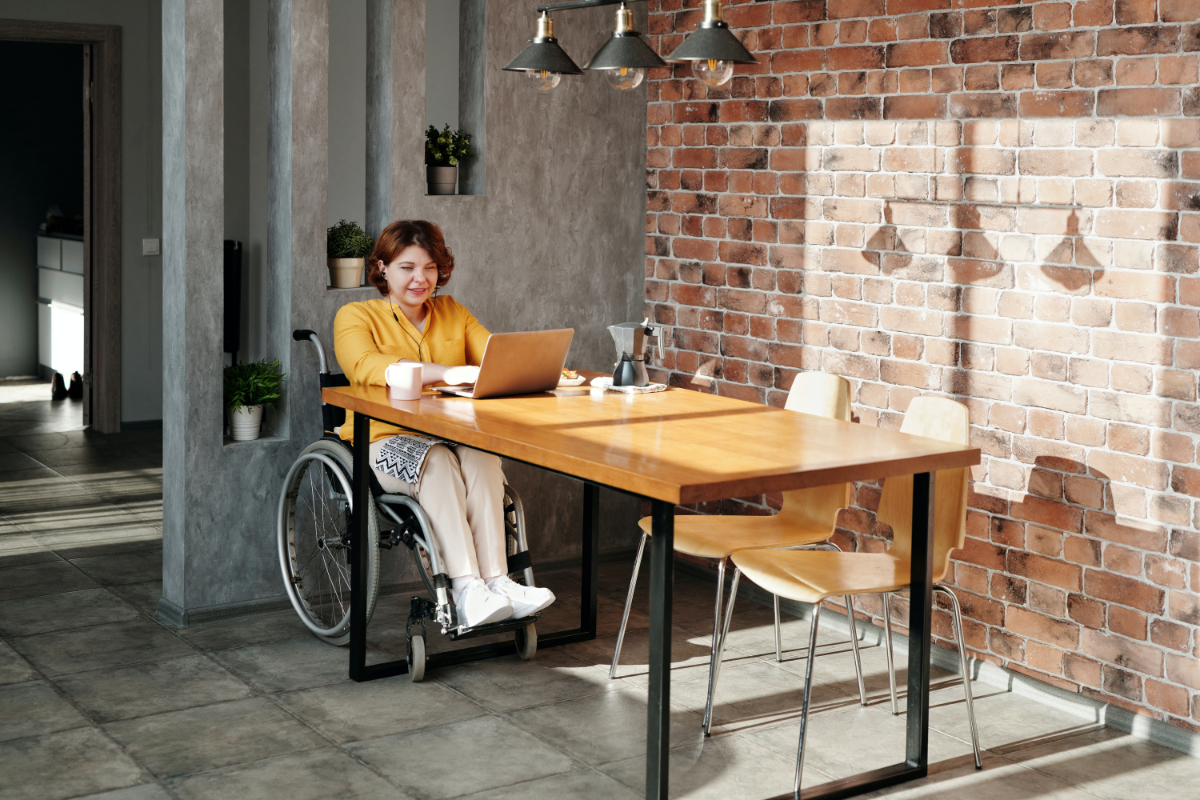Although it feels like a chapter from a distant past, the COVID-19 pandemic brought with it a seismic shift in how we work. Once seen as an occasional luxury or even a rarity, remote work has now become a staple in our work culture.
With many companies embracing the change, it’s not uncommon to find employees enjoying the flexibility of working from home at least once a week. This newfound freedom allows us to tailor our workdays to our unique rhythms. However, it’s not without its challenges.
True, we might have an extra hour to sleep in the mornings, but navigating the work-from-home landscape isn’t always a walk in the park. The blurred lines between work and home can often lead to added responsibilities and even strain our mental and physical well-being.
So, how, then, can you manage your time to ensure you’re staying productive while taking care of your mental and physical health? Dive in as we explore 12 healthy habits when working from home.
Table of Contents
Having a Routine That Works for You
When working from home, it’s easy to slip into a laid-back mode, snoozing the alarm and working late, but that’s a trap we want to avoid. Our brains love routine, and a consistent structure to our days can help us stay focused and productive.
Creating a routine that works for you is key to successfully managing your life when working from home.
If you previously worked in an office, you should try to keep the same routine you had then. Get up early, get dressed, grab a cup of coffee and kickstart your day.
If you don’t have defined work hours, develop a routine you can do consistently to set yourself up for success whenever you are ready to get to work. Remember, your routine should suit your life and work style, so experiment and find what works best for you.
Sticking to Your Schedule
It’s one thing to create a routine and schedule, but sticking to it is where the real challenge lies. However, maintaining a strict adherence to your schedule can significantly improve your work-life balance.
When you set a schedule and follow it consistently, you’ll be able to clearly delineate between work and personal time, ensuring that neither aspect of your life is neglected. Plus, you’ll be setting healthy boundaries for your work and personal life.
This means that when you’re working, you’re fully focused on your tasks, and when you’re off the clock, you can fully immerse yourself in your personal life. It’s a way of respecting both your work and personal time, leading to a healthier mindset when working from home.
But don’t forget to be realistic when setting your schedule. It should be flexible enough to accommodate unexpected situations but rigid enough to keep you on track. And remember, every day doesn’t have to be 100% scheduled or look exactly the same.
Working When You’re Most Productive
Not everyone is at their most productive during the traditional 9 to 5 workday. Some of us are early birds who are most alert in the morning, while others are night owls who hit their stride in the evening.
By aligning your work hours with your peak productivity times, you can get more done in less time. Not only does this increase your efficiency but also frees up more time for rest and relaxation. And with less stress and more downtime, you’re likely to feel happier, healthier, and more balanced.
So, take some time to identify when you’re most productive. Is it early in the morning, late at night, or sometime in between? Once you’ve figured it out, adjust your work hours accordingly.

Working in a Dedicated Workspace
One of the keys to staying productive when working from home is having a dedicated workspace. This doesn’t necessarily mean you need a separate room; it could be a specific corner of your living room or even your kitchen table. The point is to have a place where you can focus on your work and where your brain knows it’s time to get down to business.
A dedicated workspace also plays a crucial role in ensuring physical comfort. Sitting on your couch or bed may sound appealing, but it can lead to poor posture and related health issues over time. Invest in a good chair and desk, and ensure your workspace has good lighting.
Creating a healthy, dedicated workspace also involves keeping it clean and clutter-free. A messy workspace can be a source of stress and distraction. So, make it a habit to tidy up at the end of each day. You’ll start the next day with a clear mind and a clean slate.
Limiting Distractions
Working from home comes with its fair share of potential distractions. From household chores to the allure of social media, it’s easy to get sidetracked. That’s why it’s important to limit these distractions as much as possible.
One effective strategy is to set boundaries with your family or housemates. Let them know your work hours and ask them to respect your space during that time. If you’re struggling with digital distractions, consider using apps that block or limit your time on certain websites.
Minimizing interruptions helps you maintain focus but also reduces stress. When you’re not constantly being pulled away from your work, you can achieve a state of flow where you’re fully immersed in what you’re doing. This leads to higher productivity and a sense of satisfaction at the end of the day.
Prioritizing Your Mental Health
When working from home, it’s easy to overlook our mental health. But it’s important to remember that our mental well-being is just as crucial as our physical health.
So, how can we take care of our mental health while working remotely?
First, make self-care a priority. This can be anything from taking a relaxing bath to reading a book or practicing mindfulness. It’s about taking time for yourself to recharge and rejuvenate.
Next, perform regular mental health check-ins. Ask yourself how you’re feeling and be honest with your answers. If you’re feeling stressed or overwhelmed, don’t ignore these feelings. Instead, try to understand what’s causing them and find ways to manage them.
Finally, don’t hesitate to seek professional help if you need it. There’s no shame in asking for support. In fact, it’s one of the bravest things you can do!
Staying Connected
Working from home can sometimes feel isolating. We miss the casual chats by the water cooler, the team lunches, and the simple pleasure of being around other people. But just because we’re physically apart doesn’t mean we can’t stay connected.
Make an effort to maintain connections with your coworkers. Schedule virtual coffee breaks or team lunches, and use video calls for meetings instead of just audio. Seeing each other’s faces can make a big difference in feeling connected.
But don’t limit your connections to just work. Reach out to friends and family regularly or join online communities or forums related to your interests. Human connection is crucial for our well-being, so even though you’re working remotely, don’t forget to stay connected.

Being Physically Active Every Day
It’s no secret that physical activity is good for our bodies but it’s also crucial for our mental health. Regular physical activity can help reduce feelings of anxiety and depression, improve mood, and boost overall well-being.
When working from home, it’s all too easy to stay glued to our desks all day, but that’s a habit we need to break.
Try to incorporate some form of physical activity into your daily routine. It could be a morning jog, a midday yoga session, or a quick workout during your lunch break. Even something as simple as taking a walk around the block can make a difference.
The goal is to get moving, so choose an activity you enjoy; you’ll be more likely to stick with it.
Taking Regular Breaks
Ever noticed how your mind starts to wander after working for long stretches without a break? That’s your brain telling you it needs a breather.
Regular breaks are essential for maintaining productivity and focus. They give your mind a chance to rest, rejuvenate, and come back stronger.
Try to take a short break every hour or so. Stand up, stretch, take a few deep breaths, or even do a quick physical activity. You’ll be surprised at how much these small pauses can refresh your mind and body. And remember, it’s not about how long your break is; it’s about stepping away from your work for a moment to recharge.
Preparing Healthy Meals in Advance
Now, let’s talk about food. It’s not just fuel for our bodies but also for our minds. A balanced diet filled with nutritious meals can significantly improve our energy levels, focus, and overall productivity. Plus, staying hydrated throughout the day helps maintain cognitive function and mood.
When you’re working from home, it’s all too easy to fall into the habit of snacking on unhealthy foods or skipping meals altogether. To avoid this, planning and preparing your meals in advance can be a game-changer.
Start by setting aside some time each week to plan your meals. This could be a fun weekend activity where you explore new recipes and create a menu for the week ahead. Next, make a shopping list based on your meal plan and stick to it. This not only ensures you have all the ingredients you need but also helps avoid impulsive purchases of unhealthy snacks.
Once you’ve got your ingredients, batch-cook your meals. This means preparing large portions of meals that can be portioned out and stored for the week. This way, when lunchtime rolls around, you’ve got a healthy meal ready to go.
And don’t forget about snacks! Prepare some healthy options like cut-up veggies, fruits, or nuts so you have something nutritious to reach for when hunger strikes.
Unplugging at the End of the Day
When your home is your office, it can be tough to switch off from work mode, but it’s essential to draw a clear line between your work and personal life. Unplugging at the end of the day not only helps maintain this boundary but also allows your mind to rest and recharge.
So, how can you unplug? Easy. You can start by shutting down your computer and turning off your work phone. Or maybe you’ll find creating an end-of-day ritual, like taking a walk or reading a book, more helpful. Whatever it is, make sure it signals the end of your workday and the start of your personal time.
Taking Time Off When Sick
Here’s a scenario that’s all too common when working from home: You wake up feeling under the weather, but instead of taking the day off, you decide to power through. After all, you’re at home, right? Wrong. This is a habit we need to break!
Even when working from home, it’s essential to take time off when you’re sick. Your body needs rest to recover and heal. And let’s not forget that working while sick can impact your productivity and the quality of your work, plus it can prolong your recovery time.
The next time you’re tempted to work through a cold or fever, remember this: Your health comes first. Always! Don’t hesitate to take a sick day when you need it. Your work will still be there when you’re feeling better, and you’ll be in a better state to tackle it.
Conclusion
Working from home can be a blessing, but it can also pose unique challenges. The 12 healthy habits we’ve discussed in this article are not just about making your work-from-home life more productive; they are about making it healthier and more balanced.
From maintaining a routine, setting a strict schedule, to taking regular breaks throughout your day, it’s all about finding the right balance and being mindful of your health and well-being.





